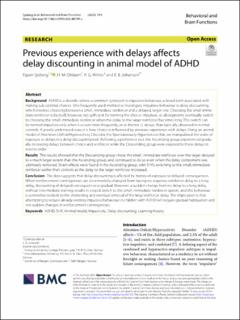Previous experience with delays affects delay discounting in animal model of ADHD
Peer reviewed, Journal article
Published version
Permanent lenke
https://hdl.handle.net/11250/3113446Utgivelsesdato
2023Metadata
Vis full innførselSamlinger
Sammendrag
Background ADHD is a disorder where a common symptom is impulsive behaviour, a broad term associated with making sub-optimal choices. One frequently used method to investigate impulsive behaviour is delay discounting, which involves choosing between a small, immediate reinforcer and a delayed, larger one. Choosing the small imme- diate reinforcer is by itself, however, not sufficient for terming the choice impulsive, as all organisms eventually switch to choosing the small, immediate reinforcer when the delay to the larger reinforcer becomes long. This switch can
be termed impulsive only when it occurs more frequently, or at shorter LL delays, than typically observed in normal controls. A poorly understood aspect is how choice is influenced by previous experience with delays. Using an animal model of Attention-Deficit/Hyperactivity Disorder, the Spontaneously Hypertensive Rat, we manipulated the order of exposure to delays in a delay discounting task. Following a preference test, the Ascending group experienced gradu- ally increasing delays between choice and reinforcer while the Descending group were exposed to these delays in reverse order.
Results The results showed that the Descending group chose the small, immediate reinforcer over the larger delayed to a much larger extent than the Ascending group, and continued to do so even when the delay component was ultimately removed. Strain effects were found in the Ascending group, with SHRs switching to the small, immediate reinforcer earlier than controls as the delay to the larger reinforcer increased.
Conclusion The data suggests that delay discounting is affected by history of exposure to delayed consequences. When reinforcement contingencies are incrementally changed from having no response-reinforcer delay to a long delay, discounting of delayed consequences is gradual. However, a sudden change from no delay to a long delay, without intermediate training, results in a rapid switch to the small, immediate reinforcer option, and this behaviour
is somewhat resilient to the shortening and eventual removal of the large reinforcer delay. The implication is that attempting to reduce already existing impulsive behaviour in children with ADHD will require gradual habituation and not sudden changes in reinforcement contingencies.

